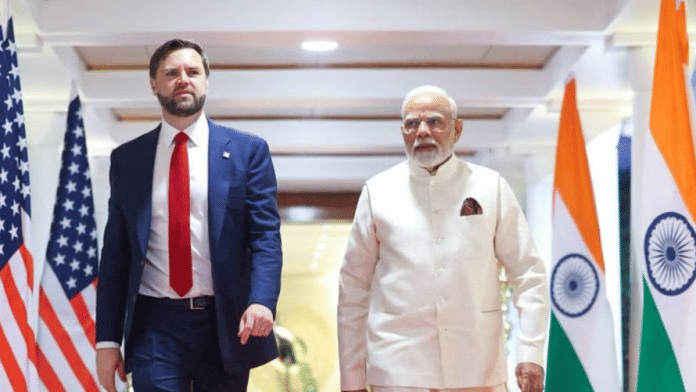New Delhi: Operation Sindoor has not been called off and continues, government sources said Sunday, underlining that the US was never a mediator and that Prime Minister Narendra Modi had told American Vice President J.D. Vance that if Pakistan attacks, Indian response will be “harder, bigger and deeper”.
“Operation Sindoor is not concluded. We are in a new normal. Drone violations of last night will be responded to,” one of the government sources said, adding that India is very clear: “If you hit, we hit harder. If you don’t hit, we don’t hit”.
Asked about The New York Times (NYT) article that the Americans intervened following fear of a nuclear conflict after India struck at eight air force bases of Pakistan, the sources said that the sequence was wrong.
They said that Vance spoke to Modi on the 9th evening and said the US had intelligence that Pakistan is planning a dramatic escalation of violence. The sources said that Vance then asked on behalf of Pakistan if there was an “off ramp”.
“What the NYT did not mention was what Modi told Vance. He told the American Vice-President that if Pakistan does anything, India’s response will be more forceful, more strong and more devastating,” the government source said. “Response to every round of Pakistan fire will be harder, bigger and deeper.”
The sources said that the call took place before Pakistan launched a spate of loitering munitions and missiles targeting Indian military installations on the intervening night of 9-10 May, and not after Indian strikes on air bases.
“Pakistan tried to hit 26 installations on 9th night, 10th early morning. All missiles fired by Pakistan were struck down by our air defences. Some armed drones and loitering munitions came through but could not cause any significant damage except falling on non-important buildings or open spaces in the military compounds. In a way, they failed,” the source said.
India responded to that with precision missile strikes on air force bases in Rafiqui, Murid, Chaklala, Rahim Yar Khan, Sukkur and Chunian which was devastating for Pakistan, the sources said.
New Delhi, they said, had been clear to every country who called over the past few days that India’s response to every round of Pakistani strikes will be “harder, bigger and deeper”.
The sources said that following the strikes on Pakistani air bases, the Director General of Military Operations (DGMO) of Pakistan Major General Kashif Abdullah called up his Indian counterpart Lieutenant General Rajiv Ghai at 1 p.m. Saturday. However, the talks could not take place because Lt. Gen. Ghai was in a meeting. The two offices then fixed the time for call at 3:35 p.m. and during this call, Pakistan said they wanted cessation of firing, they added.
The sources said that even when India carried out Operation Sindoor, hitting terror headquarters and training camps of Jaish-e-Mohammad and Lashkar-e-Toiba, the Indian DGMO had called up his counterpart and said that India has struck terror installations and that it was not interested in escalating but if Pakistan does something, India would respond.
“Every round of escalation was initiated by Pakistan. Prime Minister Modi was clear that if they hit, we will hit back stronger. The Pakistan DGMO was not talking on the first day but wanted to talk on the fourth day,” the source said.
The sources denied Pakistan claims of the National Security Advisors from both countries speaking to each other. “Neither did the NSA talk to his counterpart in Pakistan or External Affairs Minister. We believe that the right people to talk to each other are the DGMOs and that’s it,” the source said.
The sources also denied that the US acted as a mediator. “It did not act as a mediator for India. Of course they spoke to us,” the source said, adding that the first call came from Trump to Modi on the day the Pahalgam attack happened and the PM was still in Saudi Arabia.
“It was to express condolences. Since then, the conversations largely happened on the issue of the UNSC resolution. And then the question was how will India respond because we had said we will respond. Once the attack took place, there was no conversation except at official levels and then Vance called up on 9th,” the source said.
Asked how the US came to know about the agreement to halt hostilities and how Trump announced the decision before India did, the source said, “We did not tell the US. Pakistan must have since they had reached out to the US seeking an off-ramp which Vance had called about on 9th. India has spoken to multiple countries including the Saudis, the UAE and others, but there was no mediation. Our message to all of them was that if Pakistan hits, we will hit. If Pakistan does not, we will not.”
(Edited by Tony Rai)
Also Read: Indian strikes on Pakistan larger & deadlier than what Pakistan has portrayed






